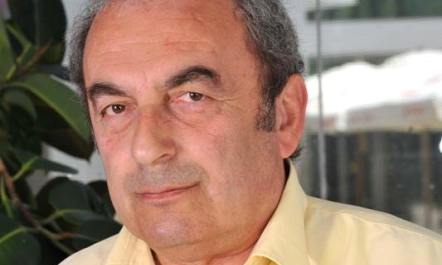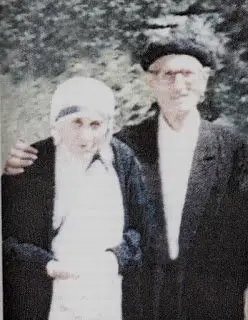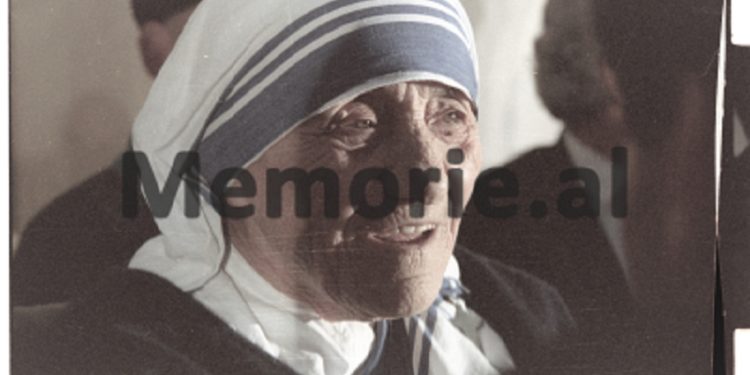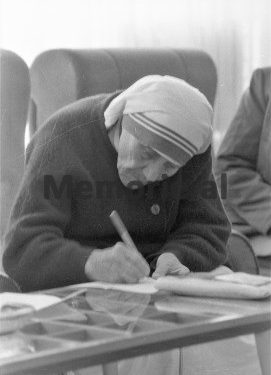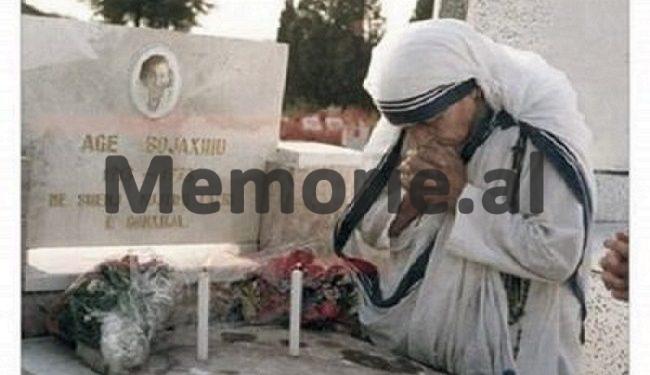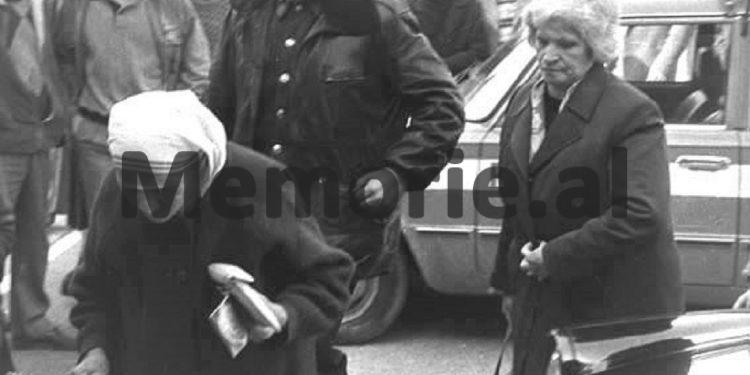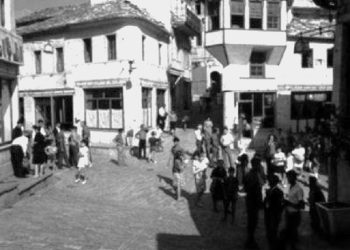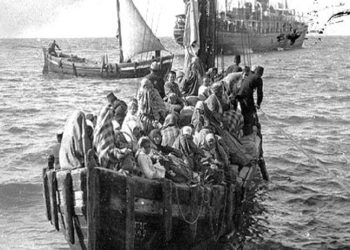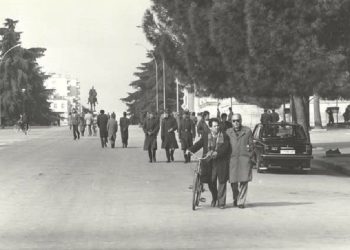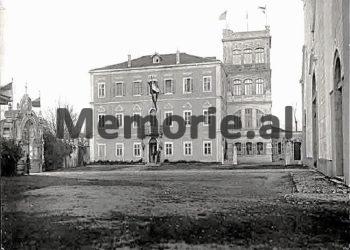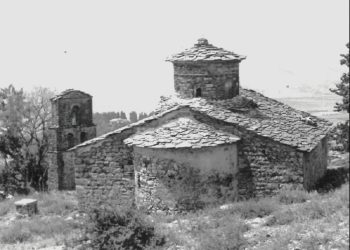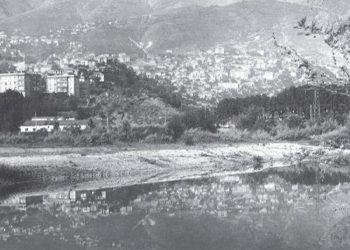From Ndue Dedaj
Memorie.al / Every time you see a derogatory or insulting labeling of someone on social networks because of their religious affiliation, a noble gesture from many years ago comes to mind. Hoxha of Puka, Hafiz Elez Hoxha (1910-2002), symbol of wisdom and tolerance, friend of Migjen in his youth and teacher of Mejtepi, received Mother Teresa in 1991, when the future saint climbed the mountain to visit her sisters’ house, in those parts. In a moment, she took the cross off her neck and gave it to the learned Hoxha, addressing him kindly: “Even if you don’t keep it hanging, like I had, keep it as a memory or give it to a devout Christian.” Hoxha, looking like a philosopher, taking the cross told the famous Nobel laureate, that; religious symbols are signs of peace and prosperity of humanity.
Every time you go to Pukë, you see among the green parks that the bust of this noble Hodge has been raised somewhere, not simply from this religious gesture, which is neither the first nor the last among the leaders of the Christian and Muslim faiths, but from a whole life dedicated to religion, knowledge, peace, wherever Hoxha Elezi served, in Pukë, Delvinë, Kukës, who in 1945, was elected chairman of the Executive Committee of the Pukë district, to be hit hard politically later , like all other clerics, after the Second World War, suffering many years in prison.
There are many messages given by clerics of different faiths, for religious harmony, which constitutes an Albanian anthology on its own, although it has not yet been published in any publication. Anton Harapi used to say: “Let’s let the world know that we can be Toskë and Gegë, Mohammedans and Christians, Albanian acquaintances of the same mind.” Of course, at the beginning of the presence of the two faiths, Catholic and Muslim, the tracks had not been laid, on the contrary, there had been violence against the inhabitants to leave the religion of the ancestors, Laramanization, crypto-catholics (secret believers), etc., as in Gjakova, Stubble, where Prendi in the eyes of the Ottoman authorities, became Shpend. “With an imposed religion, the Muslims of the North practiced two faiths, one to please the Pasha and the Turkish authorities and the other, theirs, which was practiced at home; in other words, they celebrated Eid, but also prayed for Saint Nicholas, or made the cross praying to the Virgin Mary. (L. Rama, “Albania”, January 20, 2016.)
A Lurian, when he went to the army, he was a Catholic, named Biba, but in the army, he changed his name to Habib, also his religion and returned home a Muslim. But he got his Catholic wife from Selita, and of his four sons, the youngest, he wanted to keep him in his old religion, but he couldn’t. They all became Muslims. (Dhosi Liperi, Skenderbean Mythology, “Emar” publications, 2015.)
Religious harmony, apart from the Albanian awareness of believers, has required a lot of dedication from religious leaders, time after time, as life between Catholics and Muslims has not always been peaceful.
It is enough to see how in the novel “Bardha e Temal”, after the armed conflict between two young men from Shkodra, Sulejman Cafi and Aradi from Vlashaj, a collective religious quarrel is about to be ignited. But there is an old Muslim man who addresses Mulla Hasan as a prophet: “Even Christians were born under this sky, just like us, the blood that flowed in their veins is the same blood that flows in us; they are no less Albanian than us… Listen to me, let things go as they have been until today!” (P. Vasa, “Bardha e Temal”, Tirana 1999, pg. 215.)
This is the testament of the revivalist with two names, one Catholic (Pashko Vasa) and the other Muslim (Vaso Pasha), who served both in the West, among Christians, and in the East, among Muslims, who continues to be misunderstood even today. for his well-known poem; “O my Albania”, often taking it out of context, taken as an atheistic or anti-religious testament of his. Especially in the period of the formation of the Albanian nation, like many other progressive developments, an admirable (good) interreligious understanding began to be cultivated. Religious coexistence was a necessity and existential moral obligation among Albanians, which brought tolerance between religions, believers and their institutions.
In this way, religious tolerance becomes more and more visible, with mutual respect, for the faith of the other. Speaking about the quality of coexistence as a unifying spirit in Tirana, the researchers also bring an interesting fact, that of the Catholic Stefan Herceku, who in August 1891 laid the foundations of a new house, after calling the vicar for to bless them, he then invited three imams to sing the want over those foundations. The researcher Artan Kurti brings arguments for the coexistence and marriage relationships with different faiths, in Mati’s territory, which he describes with the master Lumo Skëndo (Mit’hat Frashëri), in his writing titled; “It’s a good habit in Mat”, decades ago: “In Mat, people don’t have fanaticism.
It is a well-known fact that there, marriages between Muslims and Christians take place, giving and receiving maids, on both sides. A Muslim maid, who marries a Christian, in the will remains in the first marriage, in the will becomes a Christian, as well as the Christian maid. Relationships get along well between them and these relationships are made not grudgingly, but with the will of both sides. So, it is not rare to find cousins with both religions there.
We call this custom “good”, because it shows that in that country, Christians and Muslims get along well. Why don’t they get along? Aren’t both sides Albanians, weren’t they once all on the same side?”! The German traveler, Karl Steinmetz at the beginning of the 20th century, in his work; “From the Adriatic to Drin te Zi”, sympathetically describes the tolerance and moderation of the Muslims of Shkodra, Mati, Lura, etc.
According to the researcher Idriz Xhomara, although often, it is Lura that is taken as a model of religious tolerance, the most significant example is that of the village of Zajs in Selitë, of whose tribes, only one was Muslim, Cara. Likewise, in the village of Baz, once the banner of Rranza, there is a tribe, Daçi with the same surname, where part are Catholics and part are Muslims. It was a tradition for friends and godparents to go to the respective holidays, Easter or Eid, experiencing pleasure for their participation. The cases of enmity between the two communities (Catholic and Muslim) can be counted on the fingers of the hand between generations, while they were not very rare within the same community.
The written and unwritten chronicle of good behavior between believers of different faiths is outstanding. Father Zef Pllumi, when he returns from the Maliqi marsh (Orman Pojani camp), the first house he knocks on in Shkodër was that of his fellow sufferer, Xhabir Dibra, where “while we were eating those delicious dishes, I thought to myself: How lucky he is poverty when brothers do it. The Gospel must be lived, not just preached. It was a Muslim family: none of them knew about Christ or the Gospel. I myself saw that I know little about Islam. The true Gospel was lived even by those who do not know it”, when there was love between people and moments of happiness on earth. (Father Zef Pllumi, “Live only to tell me”, Tirana 2006, p. 245.)
Yes, Father Zefi has conveyed another precious memory from the prison: “When there was a debate in the discussions held by the prisoners between different faiths, about philosophical or theological problems, Hafiz Ali Tari, among the most cultured religious of the Muslim religion, was said to everyone in a clear way: “This matter stands like this, because Pjeter Meshkalla also said so”!
The tradition continues to appear in very noble gestures and episodes, which those who perform them have together, as they say, and not to catch the cameras. The muezzin of the mosque of the city of Klina, said that Mikel Quni, for every Eid celebration, voluntarily cleans the windows of the mosque, although he is of the Catholic faith, thus becoming the best example of inter-religious tolerance in Kosovo.
In a television report by the journalist of “Top Channel” Klodiana Kapo, it is said: “In the border village of Hot, in Malësë i Madhe, where there are more than 500 Catholic houses, lives the Muslim Bajraktari of this village, Ermir Bajraktari, on whose land, the village church was also built in the dedication of Saint Nicholas.
The highlanders respect and honor this man, as the last champion of Hoti. He is among the main ones who are invited to resolve various disputes and forgive bloodshed.” (Newspaper “Bota sot”, July 26, 2015.) Wasn’t it Jaku, a Catholic, who donated land to Hoxha to build the Gjakova mosque, and thus the city itself took its name?
In the 30s, the sheikh of Tirana took his daughters to Catholic schools to learn, as he understood that knowledge was important and that religion was not divisive, but unifying. So, just as we have Vincens Prennushin, Prend Dočin, Ndoc Nikaj, Mikel Koliq and Ernest Troshanin; Fan Nolin, Visarion Xhuvani and Atenagora, we also have Hafiz Sabri Koçi, the last of a constellation of patriots, teachers, poets and scholars, such as Hoxha Tahsini, Hoxha Kadri Prishtina, Hafiz Ali Ulqinaku, Hafiz Ibrahim Dalliu, Said Najdeni (Hoxha Voka ), Hafiz Ali Korça, Dervish of Luzhë (Mountain of Gjakova), Mulla Idrizit Gjilani, Sheh Ibrahim Karbunara, etc.
But it is not only our story, the unique one of religious coexistence, starting from the family. Even today, there are quite a few marriages of Catholic boys, with Muslim girls and vice versa, a succession of marriages of couples of two faiths. People of different faiths lived under one roof, as in Lure massively, where one brother was a Catholic, the other a Muslim, and in other regions, which excludes any disparagement of the other’s religion.
And not only that, there is no room for the old slang labels “Kaurr”, “Turk” (for Mohammedan) etc. Only the lack of civic and cultural education brings such things. Especially in the conditions of Islamic radicalism in Kosovo, the punishment of the self-proclaimed imams of two mosques on the outskirts of Tirana, for supporting terrorism, etc., we are not allowed to bring down a valuable tradition among Albanians, on the contrary, it should serve as a compass, on the way to the future in the global society. Memorie.al




